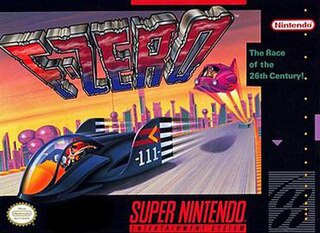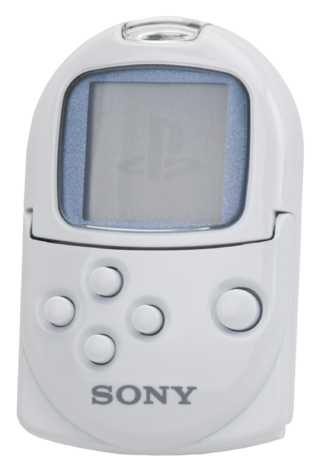
The Game.com is a fifth-generation handheld game console released by Tiger Electronics on September 12, 1997. A smaller version, the Game.com Pocket Pro, was released in mid-1999. The first version of the Game.com can be connected to a 14.4 kbit/s modem for Internet connectivity, hence its name referencing the top level domain .com. It was the first video game console to include a touchscreen and the first handheld console to include Internet connectivity. The Game.com sold fewer than 300,000 units and was discontinued in 2000 because of poor sales.

The Game Boy Color is a handheld game console, manufactured by Nintendo, which was released in Japan on October 21, 1998 and to international markets that November. It is the successor to the Game Boy and is part of the Game Boy product line.
Payola, in the music industry, is the illegal practice of paying a commercial radio station to play a song without the station disclosing the payment. Under US law, a radio station must disclose songs they were paid to play on the air as sponsored airtime. The number of times the songs are played can influence the perceived popularity of a song, and payola may be used to influence these meters. The Federal Communications Commission (FCC) treats payola as a violation of the Sponsorship Identification Rules, which requires any broadcast of paid material to include a disclosure.

F-Zero is a racing video game developed and published by Nintendo for the Super Nintendo Entertainment System. The game was released in Japan on November 21, 1990, in North America in August 1991, and in Europe in 1992. F-Zero is the first game of the F-Zero series, and was a launch title for the SNES. It was released for the Virtual Console service on various Nintendo platforms over the years and as part of the Super NES Classic Edition in 2017.

Beatmania (ビートマニア) is a rhythm video game developed and distributed by Japanese game developer Konami and first released in December 1997. It contributed largely to the boom of music games in 1998, and the series expanded not only with arcade sequels, but also moved to home consoles and other portable devices, achieving a million unit sales. The Bemani line of music games from Konami is named after the series, was first adopted in the arcade release of Beatmania 3rdMix and kept ever since. The series came to an end with the last game being Beatmania The Final, released in 2002.

Love and Rockets were an English rock band formed in 1985 by former Bauhaus members Daniel Ash, David J and Kevin Haskins after that group split in 1983. Ash and Haskins had recorded and performed in another band, Tones on Tail, between 1982 and 1984. Love and Rockets' fusion of underground rock music with elements of pop music provided an early catalyst for alternative rock. They released seven studio albums before breaking up in 1999 and reformed briefly in 2007 for a few live shows, before splitting again in 2009.

Sonic Advance is a 2001 platform game developed by Dimps for the Game Boy Advance (GBA). It was the first Sonic the Hedgehog game released on a Nintendo console with Sonic Adventure 2: Battle on the Nintendo GameCube (GCN), and was produced in commemoration of the series' tenth anniversary. The story follows Sonic, Tails, Knuckles, and Amy as they journey to stop Doctor Eggman from taking over the world. Controlling a character, players are tasked with completing each level, defeating Eggman and his robot army, and collecting the seven Chaos Emeralds.
Payolas was a Canadian rock band that was most prominent in the 1980s.
1998 saw many sequels and prequels in video games, such as F-Zero X, Marvel vs. Capcom, The Legend of Zelda: Ocarina of Time, Metal Gear Solid, Pocket Monsters: Pikachu, Resident Evil 2, Sonic Adventure, Street Fighter Alpha 3, The House of the Dead 2, and Tomb Raider III, along with new titles such as Banjo-Kazooie, Dance Dance Revolution, Gex: Enter the Gecko, Half-Life, MediEvil, Parasite Eve, Radiant Silvergun, Spyro the Dragon, StarCraft and Xenogears. Earlier arcade video games such as Virtua Fighter 3 and Tekken 3 were also ported for home consoles in 1998.

Console is an electronic music project founded by Martin Gretschmann, the former lead programmer for the German band The Notwist. The band incorporates elements of electronic music. The band consists of Miriam Osterrieder, Christoph Brandner (drums), Axel Fischer, Michael Schwaiger, Anton Kaun (visuals), and Martin Gretschmann (computer).

Miki Nakatani is a Japanese actress and singer. She began her career as a member of the girl group Sakurakko Club from 1991 to 1993, wherein she formed the duo Key West Club with member Keiko Azuma.

Robert Jens Rock is a Canadian record producer, sound engineer and musician, best known for producing rock bands and music artists such as Metallica, Mötley Crüe, Bon Jovi, Aerosmith, The Tragically Hip, the Cult, 311, Our Lady Peace, Bryan Adams, the Offspring, Michael Bublé, Black Veil Brides, David Lee Roth, and Ron Sexsmith.

The PocketStation is a memory card peripheral by Sony Computer Entertainment for the PlayStation home video game console. Categorized by Sony as a combination of a Memory Card and a miniature personal digital assistant, the device features a monochrome liquid crystal display (LCD), infrared communication capability, a real-time clock, built-in flash memory, and sound capability. To use the device's memory card functionality, it must be connected to a PlayStation through a memory card slot. It was released exclusively in Japan on January 23, 1999.

Nigel Olsson is an English rock drummer and singer best known for his long-time affiliation with Elton John. A dynamic drummer and backing vocalist, Olsson helped establish the Elton John sound as a member of the Elton John Band alongside bassist Dee Murray.

The Game Boy is an 8-bit fourth generation handheld game console developed and manufactured by Nintendo. It was first released in Japan on April 21, 1989, in North America later the same year, and in Europe in late 1990. It was designed by the same team that developed the Game & Watch series of handheld electronic games and several Nintendo Entertainment System (NES) games: Satoru Okada, Gunpei Yokoi, and Nintendo Research & Development 1.
Howie Weinberg is an American audio mastering engineer with over 2,257 mastering credits, three TEC Awards, 21 Grammy Awards, two Juno Awards, and one Mercury Prize.

Rocket Man: The Definitive Hits is a compilation album by English musician Elton John featuring 13 number one songs and a number of bonus tracks and live renditions. Worldwide there have been released 17 different versions of the album, including a CD/DVD combo. All versions include the title track, "Rocket Man ".

"Rocket Man" is a song written by English musician Elton John and songwriter Bernie Taupin, and performed by John. It was originally released on 17 April 1972 in the US, as the lead single to John's album Honky Château. The song first charted in the UK on 22 April, rising to No. 2 in the UK Singles Chart and No. 6 in the US Billboard Hot 100, becoming a major hit single for John.














